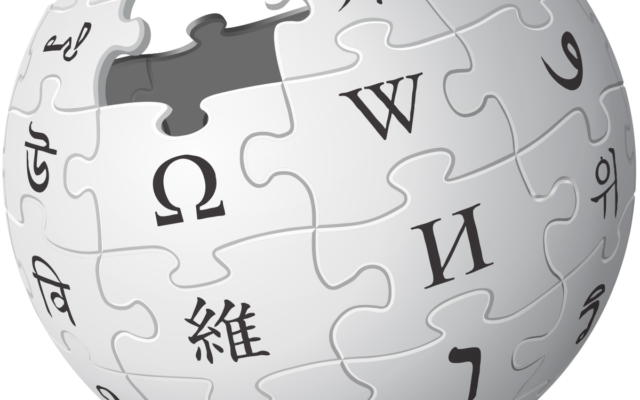OPINION: Wikimedia – the case for protecting an online global phenomenon
Vivian Wineman reflects on the possible effects of the Online Safety Bill on Wikipedia, the largest gathering of information in human history
After my father passed away, almost 50 years ago, we discovered that for three years of his life he had been keeping a diary.
This was written largely in English, which is itself interesting, since it was not his native language, but several times he inserted a well-known French proverb, ‘rien n’arrive ni comme on l’e craint ni comme on l’espere’; Nothing happens either as you fear or as you hope.

If I had to cite one rule which, I think, should guide people who want to be active in public life it would be to expect the unexpected. In politics this manifests itself frequently as the Law of Unintended Consequences.
Matthew Parris in the Times recently quoted a leading politician as saying that the unexpected always happens. Of course that is not true. Most unexpected things do not happen and are just forgotten. The converse is true, however. What actually happens is usually, if not almost always, unexpected.
We have a rather striking example of this going through Parliament right now. The Online Safety Bill is designed to protect children, and other vulnerable people, from exposure to harmful material on the internet.
The measures proposed by the bill would impose duties of care on social media companies before such material goes up, and would impose Age Gating requirements protecting vulnerable children.
I am writing this as a trustee of Wikimedia UK, the national chapter for the global Wikimedia movement and a registered charity.
Not surprisingly this has caused a great deal of concern among the big tech, social media companies such as Whats App and its rivals.
The need to balance people’s right to privacy against the need to protect the vulnerable will occupy legislators and their advisors for a long time to come. The big tech companies, however, can look after themselves.
The same cannot be said of another, albeit unintended, target of the legislation. Wikipedia. I am writing this as a trustee of Wikimedia UK, the national chapter for the global Wikimedia movement and a registered charity.
I am sure that everyone is aware of Wikipedia but it is worth setting out some salient facts about it. Wikipedia is the largest gathering of information in human history. It is published in more than 300 languages. The largest version unsurprisingly is English where it has published 6.64 million articles.
This compares with 400,000 for Encyclopaedia Britannica, itself an impressive achievement. Worldwide there are now 60 million articles. If Wikipedia were published in print it would take up one thousand volumes of 1,200 pages each.
That’s more than 1 million pages, occupying 80 metres of shelf space.
The organisation is growing at a pace. 555 articles are being added to the English version every day; worldwide 5.7 articles are added every second.
If Wikipedia were published in print it would take up one thousand volumes of 1,200 pages each.
With the increase in quantity has come a surge in quality. The concerns raised in the noughties about the accuracy of its articles have now largely been dispelled. As the Economist put it in January 2021, the reputation of Wikipedia has never been higher.
For the last ten years it has been consistently ranked as one of the top ten websites in the world, with the number of unique visitors numbered in the tens of millions.
YouTube and Facebook are linking with Wikipedia to root out fake news.
It could have exploited its position in the market for profit but has chosen not only to remain non profit but to reject advertising so as not to compromise its independence.
As a result though Wikipedia’s impact is massive, its resources are exiguous. One of Wikimedia UK’s key areas of work is education, including enabling all learners in the UK to have access to information that until only recently was available only to students at august universities, with access to well stocked libraries. Achieving this aim will put a great strain on Wikipedia’s resources even before the legislation.
The new legislation will require an onerous process of editing, before articles can go on the website. Whereas at present articles are vetted on an ordinary peer review basis, if the Bill goes through they will have to be vetted by lawyers who will naturally need to be paid and who will have every incentive to err on the side of caution, as is the case with libel lawyers.
Similarly, asking someone to prove his/her age before entering the site might be easy for a tech company with huge resources but it will be impossible for a non-profit to capture and organise the data involved and to comply with the ever increasing legislation on this topic.
The Bill has passed the House of Commons and at the time of writing is going through the committee stage in the House of Lords. Peers tend to take their responsibilities very seriously. Lets hope this Bill with its surely unintended consequences does not slip through in its current state.
- Vivian Wineman is a former president of the Board of Deputies

Thank you for helping to make Jewish News the leading source of news and opinion for the UK Jewish community. Today we're asking for your invaluable help to continue putting our community first in everything we do.
For as little as £5 a month you can help sustain the vital work we do in celebrating and standing up for Jewish life in Britain.
Jewish News holds our community together and keeps us connected. Like a synagogue, it’s where people turn to feel part of something bigger. It also proudly shows the rest of Britain the vibrancy and rich culture of modern Jewish life.
You can make a quick and easy one-off or monthly contribution of £5, £10, £20 or any other sum you’re comfortable with.
100% of your donation will help us continue celebrating our community, in all its dynamic diversity...
Engaging
Being a community platform means so much more than producing a newspaper and website. One of our proudest roles is media partnering with our invaluable charities to amplify the outstanding work they do to help us all.
Celebrating
There’s no shortage of oys in the world but Jewish News takes every opportunity to celebrate the joys too, through projects like Night of Heroes, 40 Under 40 and other compelling countdowns that make the community kvell with pride.
Pioneering
In the first collaboration between media outlets from different faiths, Jewish News worked with British Muslim TV and Church Times to produce a list of young activists leading the way on interfaith understanding.
Campaigning
Royal Mail issued a stamp honouring Holocaust hero Sir Nicholas Winton after a Jewish News campaign attracted more than 100,000 backers. Jewish Newsalso produces special editions of the paper highlighting pressing issues including mental health and Holocaust remembrance.
Easy access
In an age when news is readily accessible, Jewish News provides high-quality content free online and offline, removing any financial barriers to connecting people.
Voice of our community to wider society
The Jewish News team regularly appears on TV, radio and on the pages of the national press to comment on stories about the Jewish community. Easy access to the paper on the streets of London also means Jewish News provides an invaluable window into the community for the country at large.
We hope you agree all this is worth preserving.






















